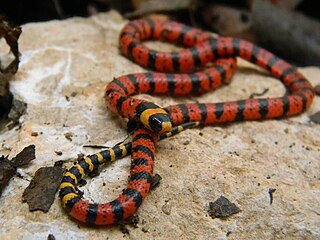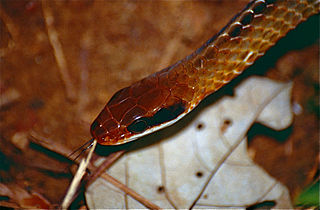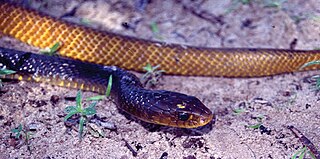
Colubridae is a family of snakes. With 249 genera, it is the largest snake family. The earliest fossil species of the family date back to the Late Eocene epoch, with earlier origins suspected. Colubrid snakes are found on every continent except Antarctica.

The milk snake or milksnake, is a species of kingsnake; 24 subspecies are currently recognized. Lampropeltis elapsoides, the scarlet kingsnake, was formerly classified as a 25th subspecies, but is now recognized as a distinct species. The subspecies have strikingly different appearances, and many of them have their own common names. Some authorities suggest that this species could be split into several separate species. They are not venomous to humans.

Dibamidae or blind skinks is a family of lizards characterized by their elongated cylindrical body and an apparent lack of limbs. Female dibamids are entirely limbless and the males retain small flap-like hind limbs, which they use to grip their partner during mating. They have a rigidly fused skull, lack pterygoid teeth and external ears. Their eyes are greatly reduced, and covered with a scale.

Boa is a genus of boas found in Mexico, the Caribbean, and Central and South America. Five extant species, and one extinct, are currently recognized.

Garter snake is the common name for small to medium-sized snakes belonging to the genus Thamnophis in the family Colubridae. Native to North and Central America, species in the genus Thamnophis can be found in all of the lower 48 United States, and nearly all of the Canadian provinces south of the Northwest Territories and Nunavut—with the exception of Newfoundland and Labrador. They are found from the subarctic plains of west-central Canada east through Ontario and Quebec; from the Maritime Provinces and south to Florida, across the southern and central U.S. into the arid regions of the southwest and Mexico, Guatemala and south to the neotropics and Costa Rica.

The Acrochordidae, commonly known as wart snakes, Java wart snakes, file snakes, elephant trunk snakes, or dogface snakes are a monogeneric family created for the genus Acrochordus. This is a group of basal aquatic snakes found in Australia and tropical Asia. Currently, three species are recognized.

Sibon nebulatus, commonly known as the cloudy snail-eating snake, is a species of small, slender arboreal snake which is found in southern Mexico, Central America, northern South America, Isla Margarita, and Trinidad and Tobago.

Amerotyphlops brongersmianus, known commonly as Brongersma's worm snake or the South American striped blindsnake, is a species of harmless blind snake in the family Typhlopidae. The species is native to South America and Trinidad and Tobago in the Caribbean. No subspecies are currently recognized.

Python is a genus of constricting snakes in the Pythonidae family native to the tropics and subtropics of the Eastern Hemisphere.

The speckled kingsnake is a species of nonvenomous kingsnake in the family Colubridae. The species is endemic to the United States.

Micrurus nigrocinctus, commonly known as the Central American coral snake, is a species of a highly venomous snake in the family Elapidae. The species is endemic to Latin America from southern Mexico, Central America, to north Colombia. There are six recognized subspecies, including the nominate subspecies described here.

Micrurus diastema, commonly known as the variable coral snake, is a species of venomous snake in the family Elapidae. The species is endemic to southeastern Mexico and northern Central America. There are seven recognized subspecies.
Oligodon ancorus, commonly known as the northern short-headed snake, is a species of colubrid snake found on the islands of Luzon and Mindoro in the Philippines, and the island of Sumatra in Indonesia. However, whether the populations from Sumatra, described as Oligodon rhombifer, belong to this species has been contested.

The large-eyed green tree snake, also known commonly as the splendid dagger-tooth tree snake, is a species of venomous snake in the family Colubridae. The species is endemic to Africa. There are three recognized subspecies.

The brown sipo is a species of snake of the family Colubridae.

The indigo snake, also known as the yellow-tail cribo, is a species of snake in the family Colubridae. This large colubrid snake is nonvenomous.

The forest vine snake, also known commonly as the twig snake and the bird snake, is a species of venomous snake in the family Colubridae. The species is endemic to Africa.

Bofa erlangeri, also known commonly as the Ethiopian house snake, is a species of snake in the family Lamprophiidae. The species is endemic to Ethiopia.

Micrurus clarki, also known commonly as Clark's coral snake, is a species of venomous snake in the family Elapidae. The species is native to Central America and northwestern South America.



















